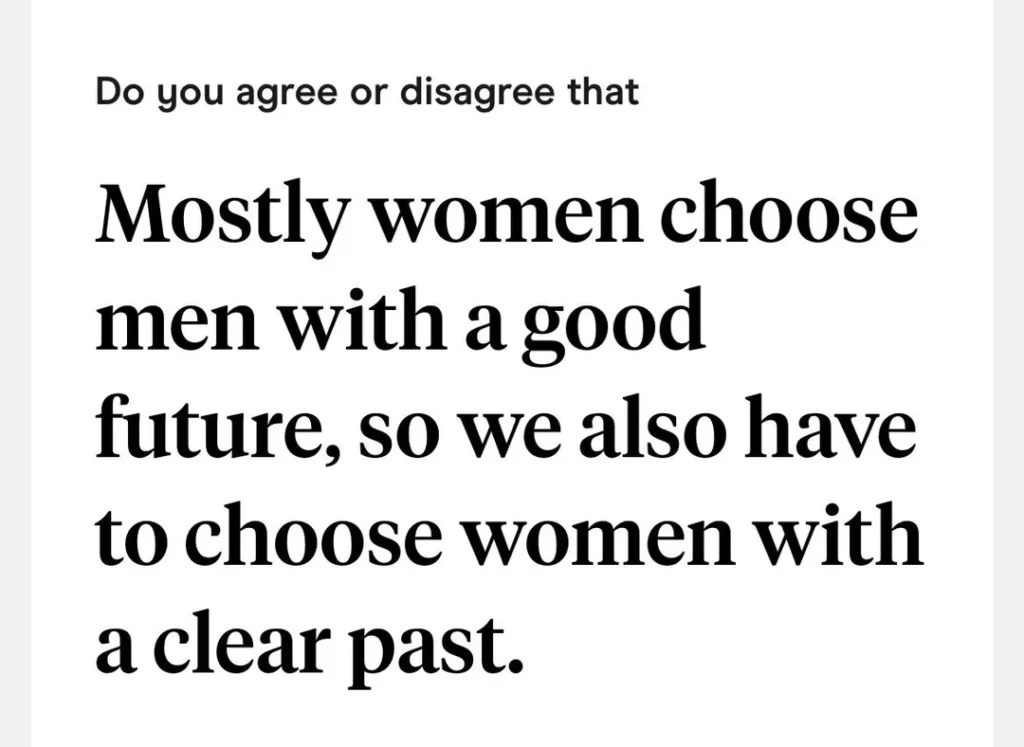The text below presents a thought-provoking statement:
“Mostly women choose men with a good future, so we also have to choose women with a clear past.”
This statement raises several questions about societal norms and expectations in relationships. But what does it really mean? Are these gender-based expectations still relevant in today’s society, or are they outdated?
Questioning Gender Roles

In modern society, these expectations are increasingly questioned. Research suggests that both men and women face significant pressures, albeit in different areas. For instance, women often feel the need to be physically attractive and involved parents, while men are pressured to be financially successful and emotionally strong.1 2
These pressures stem from long-standing gender roles that have historically placed men in the role of providers and women in the role of caretakers. However, as societal norms evolve, so too do the expectations for men and women in relationships. The idea that women should choose men based on their future prospects while men should evaluate women based on their past is an oversimplification of complex human relationships.
Evolving Expectations
In today’s world, relationships are becoming more egalitarian. Many people now seek partners who offer emotional support, shared values, and mutual respect, rather than simply fulfilling traditional gender roles. The idea that a man’s future is more important than a woman’s past overlooks the importance of present compatibility and shared goals.
Your Thoughts?

Do you agree with the sentiment in the statement, or do you believe that modern relationships should be built on more than just these traditional expectations? We invite you to share your thoughts in the comments below. How do you think societal pressures influence your own relationship choices?
This topic is rich with differing opinions, and your perspective could help shed light on how these issues are viewed today. Let’s start a conversation!
FAQ on Gender Expectations and Relationships
1. What are traditional gender roles in relationships?
Traditional gender roles in relationships typically refer to the expectation that men should be the providers and protectors, focusing on future stability, while women should be caretakers, managing the home and raising children. These roles have been shaped by cultural, religious, and societal norms over centuries.
2. Are traditional gender roles still relevant in modern relationships?
The relevance of traditional gender roles is increasingly being questioned in modern society. Many people now value equality in relationships, seeking partners who offer mutual support, shared responsibilities, and respect. However, some individuals and cultures may still adhere to traditional roles.
3. How do societal expectations impact relationship choices?
Societal expectations can heavily influence how people choose their partners. For instance, men may feel pressured to prioritize financial success, while women may feel judged based on their past relationships. These pressures can shape relationship dynamics and sometimes lead to stress or dissatisfaction if individuals feel they must conform to these norms.
4. What are modern expectations in relationships?
Modern expectations in relationships tend to emphasize equality, mutual respect, and shared responsibilities. Both partners are often expected to contribute to the household income, share in child-rearing, and provide emotional support. Compatibility, shared values, and effective communication are increasingly prioritized over traditional roles.
5. How can couples navigate differences in gender role expectations?
Open communication is key to navigating differences in gender role expectations. Couples should discuss their values, expectations, and desires early in the relationship to ensure they are on the same page. Flexibility and a willingness to compromise can help partners find a balance that works for both.
6. What are some challenges faced by couples who challenge traditional gender roles?
Couples who challenge traditional gender roles may face criticism from family, friends, or society. They may also struggle with internalized beliefs about gender roles, leading to conflicts or feelings of inadequacy. However, many find that embracing more egalitarian roles leads to greater satisfaction and stronger partnerships.
7. How do gender roles affect relationship satisfaction?
Relationship satisfaction can be affected by how well partners align in their expectations of gender roles. When both partners have a shared understanding and agree on their roles, it can lead to a harmonious relationship. On the other hand, conflicts or unmet expectations regarding gender roles can lead to dissatisfaction.
8. Can gender roles evolve over time within a relationship?
Yes, gender roles can and often do evolve over time within a relationship. As couples grow and their circumstances change, such as having children or changing careers, their roles may shift. Adaptability and ongoing communication are crucial to managing these changes effectively.




Nice Post